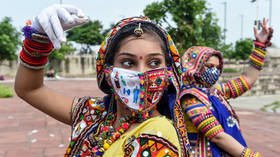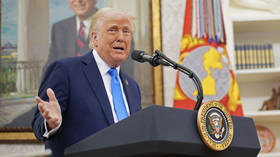Covid-19 to delay India’s rise to world’s third-biggest economy – Bank of America

The investment banking division of Bank of America (BofA) has downgraded its previous outlook on the pace at which India is set to overtake Japan as the world’s third-biggest economy.
According to the latest report from BofA Securities, it will take India another 10 years to oust Japan from the third spot. The institution had previously expected this to happen three years earlier – in 2028.
The downgrade reportedly comes as a result of the shockwave that the Covid-19 pandemic sent through the global economy, heavily impacting nations across the world and dragging down regional economies.
Also on rt.com Indian economy to grow by 12% in 2021 as private consumption & non-residential investments pick up – Moody’s“We now expect India to emerge as the third largest economy in the world in 2031/FY32, from 2028 earlier, due to the Covid 19 shock,” Indranil Sen Gupta and Aastha Gudwani, economists for BofA Securities, said in the report.
The analysts added that the South Asian nation is expected to reach Japan’s nominal GDP in dollar terms in 2031, provided it has an annual growth of 9% – assuming real GDP growth of around 6%, an average inflation rate of 5% and 2% depreciation. If India’s economy manages to grow by 10 percent, it can reportedly top Japan by 2030.
Prolonged lockdowns due to the coronavirus outbreak led to a serious economic crisis in India, leaving millions of people unemployed, many of them permanently. The country’s economy has been in recovery so far, however, the nation is expected to undergo a permanent loss of about 10% of its output against its pre-pandemic path.
Also on rt.com India on track to have its largest wheat harvest everAccording to BofA Securities, structural drivers of economic growth, like deepening financial maturity, the emergence of mass markets due to rising incomes and a forthcoming demographic dividend, are still strengthening.
The report also says that India’s skilled workforce is set to grow and income losses will likely reverse once economic stability is reached. This will be partially driven by rising employment in the services sector. The country's credit-to-GDP ratio, seen as a proxy for financial maturity, is projected to rise in the next decade with emerging mass markets pushing down the prices of goods.
The Reserve Bank of India has boosted the nation’s forex reserves, which is expected to help stabilize the Indian rupee, preventing large depreciation of the currency amid potential global shocks. Moreover, the regulator would see greater portfolio inflows and is set to lower borrowing costs for Indian companies.
Also on rt.com India now holds world’s fourth-LARGEST forex reserves“Further, sustained RBI easing is finally bringing down real lending rates that have been a drag on growth since 2016. We continue to see financials as the primary beneficiary of the India growth story,” the report said.
India has launched an ambitious vaccination campaign to inoculate some 300 million people. However, the latest rise in coronavirus cases in the country has increased concerns over a second wave of infection.
For more stories on economy & finance visit RT's business section














